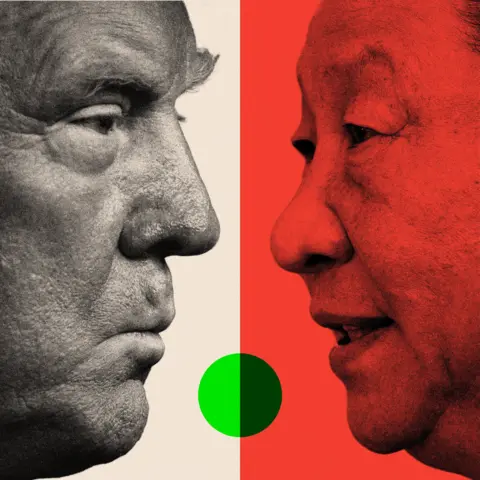 BBC
BBCIn a sports park next to the red walls and glossy blue tiles which surround Beijing’s Temple of Heaven, a group of pensioners are working out.
“I’m 74 and I hope this helps me live a long time,” one man says after he finishes his pull-ups, just as a cold wind blows leaves from cypress trees across the park, disrupting another man who is mid-headstand. Women reach for gloves and sweaters as they take turns hanging from an overhead assault course.
Chinese emperors once came to this Ming dynasty holy site to pray for a good harvest. Now the park is used by locals to enjoy their retirement after spending decades contributing to China’s spectacular growth.
 BBC/Xiqing Wang
BBC/Xiqing WangThey’ve watched their country open up to the world and their factories propel its economy, which nips at the heels of the United States as the world’s largest.
But some fear what the promises of US president-elect Donald Trump – who has vowed steep tariffs on goods made in China – means for the country’s export-driven economy.
The view of Trump on the ground
For many in China, Trump is a figure of fun and memes of him dancing to the YMCA are shared widely on social media. Others worry that he’s too unpredictable.
“I like Trump, but he’s unstable. Who knows what he might do?” says the 74-year-old pensioner, whose name has been withheld.
Some of Trump’s cabinet choices – announced since his election victory – will no doubt make people even more wary.
Marco Rubio, his pick for Secretary of State, has called Beijing “the threat that will define this century”. He is also sanctioned by Beijing. Trump’s choice for National Security Adviser, Mike Waltz, wrote earlier this month that the US should “urgently” bring the conflicts in Ukraine and the Middle East to an end so it can “finally focus strategy attention where it should be: countering the greater threat from the Chinese Communist Party”.
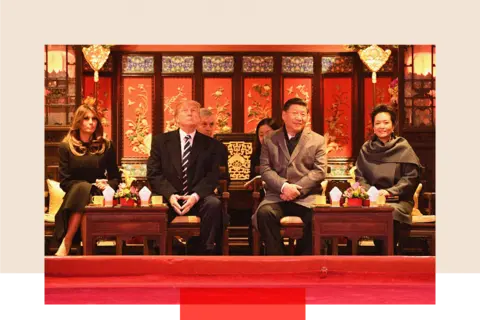 Getty Images
Getty ImagesBut China has been in training for a second Trump presidency, says Yu Jie, a Senior Research Fellow on China at Chatham House, a London-based think tank.
Despite concern on the street, she says his return comes as “no surprise” to Beijing, although she warns that the world should still “expect a roller-coaster type of relationship to unfold” when Trump takes office in January.
Beijing’s “cold war” warning to Washington
The competition between the two nations has been ramping up for some time, long before Trump won the election. It turned especially tense during the Biden administration because of tariffs and geopolitical disagreements ranging from Russia’s invasion of Ukraine to the future of Taiwan.
Yet there was dialogue, with several senior US officials making trips to Beijing.
Chinese President Xi Jinping has vowed to work with the incoming Trump administration, but he also used his last meeting with President Joe Biden to warn Washington that a “new cold war should not be fought and cannot be won”.
He added that “containing China is unwise, unacceptable and bound to fail”.
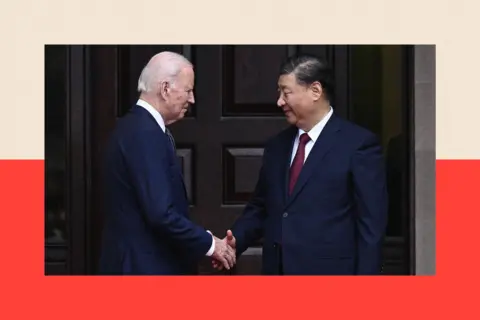 Getty Images
Getty ImagesBeijing has long accused the US and its allies of trying to contain China – they see tariffs targeting Chinese-made imports, laws restricting the country’s access to advanced AI chips and military alliances in the South China Sea and beyond as part of this approach.
And Trump’s decision to pick Rubio and Waltz suggests his administration will “take a much harsher, muscular approach with China,” says Lyle Morris from the Asia Society’s Centre for China Analysis.
“While Trump views his personal relationship with Xi Jinping as an avenue for negotiation, he will likely lean on Waltz and Rubio in fashioning a more aggressive, uncompromising policy towards China.”
They are far from the only voices in Washington that see China as a threat to US security and its economy – a view that surprises the average person in Beijing.
“You’re much better off here than in the US right now,” says the 74-year-old in the park before heading off to stretch.
From Covid blame to nuclear competition
Just north of the Temple of Heaven is the Forbidden City, where Chinese emperors lived for almost 500 years. It was here, in 2017, that Xi hosted Trump, bestowing on his guest an honour not granted to any US president since the founding of the People’s Republic of China.
Xi shut down the area and took Trump on a tour of the imperial quarters, every moment broadcast live on state TV. He was served kung pao chicken for dinner, and in turn brought a video of his granddaughter, Arabella Kushner, singing a Chinese song which went viral on social media.
It was billed by both as a high point in US-China relations, but that quickly soured after the Covid pandemic broke out in Wuhan in 2019 and spread globally in 2020. Trump repeatedly called it the “Chinese virus” and blamed the outbreak on Beijing. He also kicked off a tit-for-tat trade war, with tariffs still in place on more than $300bn (£238bn) of goods.
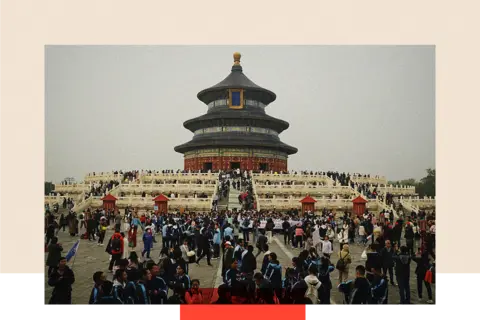
When Trump starts his second term, he will be encountering a stronger Xi, who has cemented his position at China’s helm with a historic third term – and the possibility of remaining in power for life.
Given it has the world’s largest army and navy, Washington is now concerned that the country is building a bigger nuclear arsenal.
Even as Trump was unveiling his new cabinet, Chinese state media published videos from the country’s biggest airshow of a new stealth fighter jet – the J35-A – flying vertically and upside-down. China is only the second country to boast two stealth fighters in its inventory. The other is the US. The world’s first two-seat stealth fighter, the J20-S, was also on display.
Last week, researchers at the Middlebury Institute of International Studies in California found satellite images that indicate China is working on nuclear propulsion for a new aircraft carrier.
The studies have “sparked serious concerns over Beijing’s potential adoption of a first-use strategy and increased nuclear threats, fuelling strong support to significantly boost US nuclear capabilities in response,” says Tong Zhao from think tank Carnegie Endowment for International Peace.
“Unless Trump personally intervenes, which seems unlikely, it appears the two nations are on the brink of a much more intense nuclear competition with far-reaching implications for international stability.”
The Taiwan question
Under Xi’s leadership in recent years, China has also become more assertive in its territorial claims over Taiwan and the South China Sea.
One worry is that Beijing is ramping up militarily to invade Taiwan, which it sees as a breakaway province that will eventually be under its control. Under Trump and his cabinet, would the US be willing to defend Taiwan?
It’s a question asked of every US president. Trump has dodged it, saying he wouldn’t have to use military force because Xi knew he was “crazy”, and he would impose paralysing tariffs on Chinese imports if that happened.
Despite Trump’s unwillingness to participate in foreign wars, most experts expect Washington to continue providing military assistance to Taipei. For one, it is bound by law to sell defensive weapons to the island. Two, the Trump administration sold more arms to Taiwan than any other.
“There is strong bipartisan support for continuing military aid to Taiwan. I don’t expect Trump to significantly change course on arms sales to Taiwan,” Mr Morris says.
What Trump really thinks of Xi
These glaring differences aside, Trump does seem to admire Xi’s strongman image.
In 2020 he declared that he and Xi Jinping “love each other”, even in the midst of a bitter trade war with China.
“I had a very strong relationship with him,” he confirmed in a recent interview with the Wall Street Journal.
It’s hard to know what Xi thinks – he has said very little about their relationship and barely mentions Trump by name.
In 2018, Chinese state media CGTN took direct aim at the American leader, and released an unflattering video with the sarcastic title: “Thanks Mr Trump, you are great!” It was later taken down by censors.
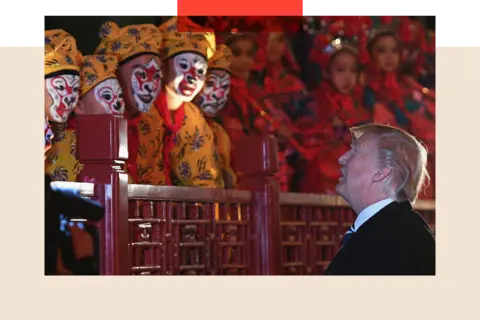 Getty Images
Getty ImagesBut what we do know is both leaders project a type of muscular nationalism. Xi’s dream is the “great rejuvenation of the Chinese nation” and Trump believes only he can “make America great again”. Both promise that they are working towards a new golden age for their countries.
Trump’s “golden age” for America incudes 60% tariffs on Chinese-made goods.
But Beijing is in no mood for a second trade war. It has troubles of its own.
A sluggish economy vs the Musk factor
President Xi’s dream of prosperity is in jeopardy. China’s economy is sluggish, its property sector is sinking, nearly 20% of its young people are struggling to find jobs and it has one of the world’s fastest growing ageing populations.
Some of this economic pain is clear at the Temple of Heaven. We join the throngs of Chinese tour groups walking through white marble gates. It has become fashionable for young people to dress up in Qing dynasty costumes although their long silk robes often fail to hide the other big trend – chunky white trainers.
Dozens of school groups are listening attentively to guides about their city’s colourful history while a queue forms around the altar to make a wish. I watch as a middle-aged woman dressed in black takes her turn. She turns three times, clasps her hands, closes her eyes and looks toward the sky. Later we ask what she hoped for. She says many people come here and ask for their children to get jobs or to get into a good school.
“We wish for better lives and prospects,” she says. While China claims to have eradicated extreme poverty, millions of labourers and factory workers across the country, those who contributed to China’s rise, will worry what about what’s to come.
Her future and the future of China’s economy may partly depend on just how serious Trump is about his tariffs. This time, Beijing is prepared, according to Yu Jie.
“China has already begun to diversify its sources of agricultural imports (notably from Brazil, Argentina and Russia) and increased the volumes of its exports in non-US allied countries. At a domestic level, the recent local government debt recapitalisation is also paving the way to offset the negative impacts on the likely trade war with the Trump Administration.”
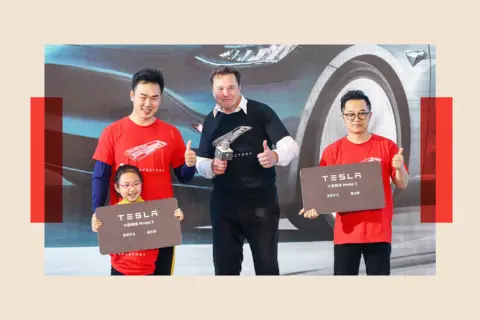 Getty Images
Getty ImagesBeijing may also have another hope. Billionaire Elon Musk now appears to have Trump’s ear. His company, Tesla, depends on China for production – about half of all its EVs are made in the country. Chinese leaders may ask if Musk can temper Trump’s trade impulses.
But the great power struggle of the 21st century is not just over trade. Xi’s dream also involves making China the world’s dominant power.
Some experts believe this is where another Trump presidency may offer Beijing an opportunity.
China’s place on the world stage
“Chinese leaders will reinforce the narrative that the US is the single and most disruptive source of global instability, while portraying China as a responsible and confident world power,” says Yu Jie.
Biden spent four years building up friendships across Asia with the likes of South Korea, Japan, the Philippines and Vietnam – all in an effort to contain China.
In the past, Trump’s “America-first” doctrine isolated and weakened these US alliances. He opted for deals over delicate diplomacy and often put a price tag on America’s friendships. In 2018, for instance, he demanded more money from South Korea to continue keeping US troops in the country.
Beijing has already built up alliances with emerging economies. It is also trying to repair its relationship with the UK and Europe, while mending historical grievances with Asian neighbours, South Korea and Japan.
If Washington’s influence does wane around the world, it could be a win for President Xi.
Back at the park, as we discuss the results of the US election, one man holds up four fingers. “He’s only got four years,” he says. “The US is always changing leaders. In China, we have more time.”
Time is indeed on Beijing’s side. Xi could be president for life – and so can afford to make slow but steady progress towards his goals.
Even if Trump does get in the way, it will not be for long.
Top picture credit: Getty Images
BBC InDepth is the new home on the website and app for the best analysis and expertise from our top journalists. Under a distinctive new brand, we’ll bring you fresh perspectives that challenge assumptions, and deep reporting on the biggest issues to help you make sense of a complex world. And we’ll be showcasing thought-provoking content from across BBC Sounds and iPlayer too. We’re starting small but thinking big, and we want to know what you think – you can send us your feedback by clicking on the button below.









